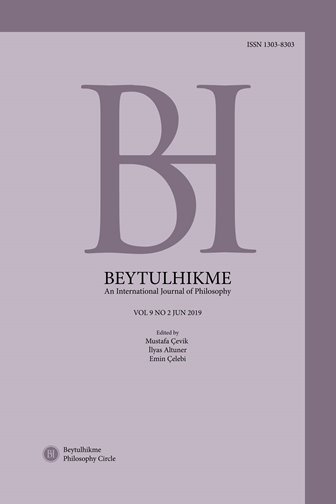Author :
Abstract
Yirminci yüzyılın başlarında modern fizikte birçok gelişme yaşanmıştır. Yaşanan bu gelişmeler, gerek fizik gerekse felsefi bakış açısından yeni sorular ve yeni bir evren algısı ortaya koymuştur. Böylelikle evreni anlamaya yönelik sorduğumuz soruların karakteri değişmiştir. Bu soruların yanıtlarını başta fizikçiler aramış, sonuç olarak öncülüğünü Planck, Einstein, Heisenberg gibi modern fiziğin kurucularının oluşturduğu bir fizikçi-filozof tipi ortaya çıkmıştır. Bu makalede ilk olarak bahsi geçen fizikçi-filozofların gözünden fizik, felsefe ve bilim ile ilgili sorunlar araştırılmıştır. Daha sonra felsefe ve bilim arasındaki ilişki tartışılıp, bu iki disiplin arasındaki çıkmazlar ve nedenleri sonuç olarak ortaya konmuştur.
Keywords
Abstract
Modern physics has experienced major advancements at the beginning of the twentieth century. However, these developments gave rise to new questions and a new perception of the universe from the perspective of both physics and philosophy. As a result, the questions which we had been asking in order to understand the universe acquired a different character. Physicists were the first to seek answers to these questions. Subsequently, a physicist-philosopher type emerged, pioneered by founders of modern physics such as Planck, Einstein, Heisenberg. This article analyses the various arguments made by the mentioned physicist-philosophers in an attempt to answer the current problems in physics, philosophy and science. Lastly, this article explains the relationship between philosophy and science and in conclusion, illustrates the existing conflicts and causal relation between them.
Keywords
- Bozkurt, N. (2004). Bilimler Tarihi ve Felsefesi. İstanbul: Morpa Kültür Yayınları.
- Cushing, James T. (2006). Fizikte Felsefi Kavramlar. İstanbul: Sabancı Üni. Yayın- ları.
- Einstein, A. (2013). Bilim ve Felsefe Yazıları (çev. N. Bozkurt). Ankara: Sentez Yayıncılık.
- Einstein, A. & Infeld L. (2015). Fiziğin Evrimi (çev. S. Turgal). Ankara: Alter Ya- yıncılık.
- Kuçuradi, İ. (1986). Nietzsche: Çağı ve Çağımız. Türk Felsefe Araştırmalarında ve Üniversite Öğretiminde Alman Filozofları. Ankara, Meteksan Baskı, 64-96.
- Örnek, Y. (1986). Bilimde, Felsefede ve Politikada Karl Jaspers. Türk Felsefe Araş- tırmalarında ve Üniversite Öğretiminde Alman Filozofları. Ankara: Meteksan Baskı, 54-63.
- Özlem, D. (2003). Bilim Felsefesi. İstanbul: İnkılap Kitabevi.
- Pais, A. (1982). Subtle is the Lord. The Science and Life of Albert Einstein. Oxford: Oxford University Press.
- Planck, M. (1996). Modern Doğa Anlayışı ve Kuantum Teorisine Giriş (çev. Y. Öner). İstanbul: Spartaküs Yayınları.
- Reichenbach, H. (2013). Bilime Yeni Pozitivist Bakış. İstanbul Konferansları (çev. N. Hızır& H. V. Eralp). Ankara: Epos Yayınları.
- Semiz, İ. (2016). Görelilik Kuramı. İstanbul: 7 Renk Basım Yayınları.
- https://www.telegraph.co.uk/technology/google/8520033/Stephen-Hawking-tells- Google-philosophy-is-dead.html/ (erişim: 22.03.2018). Öz: Yirminci yüzyılın başlarında modern fizikte birçok gelişme yaşanmıştır. Yaşanan bu gelişmeler, gerek fizik gerekse felsefi bakış açısından yeni sorular ve yeni bir evren algısı ortaya koymuştur. Böylelikle evreni anlamaya yönelik sorduğumuz soruların karakteri değişmiştir. Bu soruların yanıtlarını başta fizikçiler aramış, sonuç olarak öncülüğünü Planck, Einstein, Heisenberg gibi modern fiziğin kurucularının oluşturduğu bir fizikçi-filozof tipi ortaya çıkmıştır. Bu makalede ilk olarak bahsi geçen fizikçi-filozofların gözünden fizik, felsefe ve bilim ile ilgili sorunlar araştırılmıştır. Daha sonra felsefe ve bilim arasındaki ilişki tartışılıp, bu iki disiplin arasındaki çıkmazlar ve nedenleri sonuç olarak ortaya konmuştur. Anahtar Kelimeler: Fizik felsefesi, bilim felsefesi, fizikçi filozoflar, Planck, Einstein, Heisenberg.
